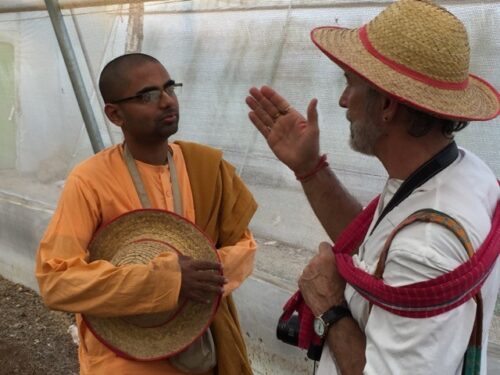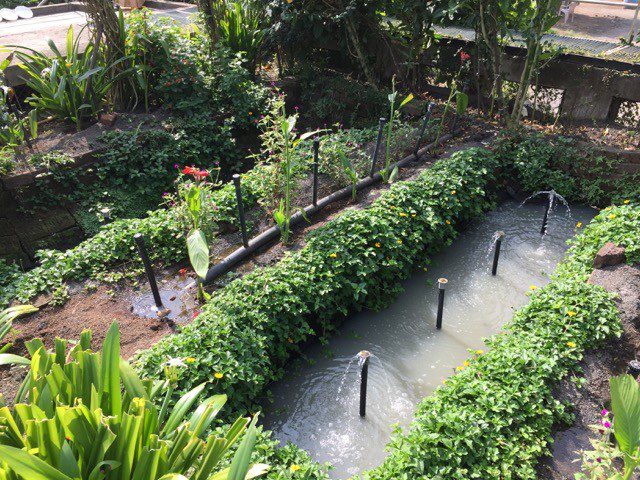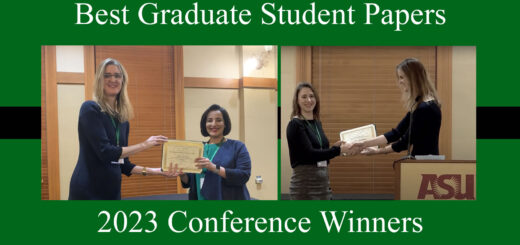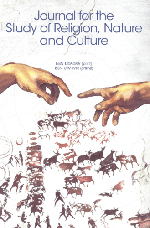Report on Hinduism and Ecology Conference

A conversation about organic farming with Nimai, one of the amazing engineer-monks living at the Govardhan Ecovillage. (Photo: Author)
I first visited the Govardhan Ecovillage in November of 2016 and was extremely impressed with what I saw. While sharing a meal in the dining area, a small forest area paved with cow dung plaster, I remarked to Gaurangadas, manager of the ecovillage, that this would be an excellent venue for a conference on Hinduism and Ecology. He immediately replied, “Let’s do it.” Thus the seed was planted for a four-day international conference titled “Hinduism and Ecology: Towards a Sustainable Future,” which took place December 11-14, 2017. Organization of the conference fell to me; by all reports our gathering was very fruitful.
The Govardhan Ecovillage is located about 100km north of Mumbai, India, in the beautiful foothills of the Sahyadri Mountains. The ecovillage is a model farm community and retreat center inspired and founded by H. H. Radhanath Swami that strives to provide an educational example of how the most fulfilling and productive life is one based on compassion and respect for all of life while living in a sacred harmony with each other and nature. Its motto is “Simple Living & High Thinking.” Radhanath Swami writes in his award-winning book The Journey Within:
The root cause of environmental pollution is pollution within the ecology of the human heart. What’s happening to the environment is an external manifestation of the ecology of the mind…Inspired by the principle of karuna (compassion), we at the Govardhan Ecovillage are trying, in our small way, to live in harmony with God and nature while embracing the dharma of compassion.
The accomplishments of the ecovillage are hardly small. A community of highly trained engineer-monks has created systems that would dazzle the best of permaculturists. These include innovative and ecologically sustainable approaches to such things as buildings, food production, water resources, animal care, energy, converting wastes into resources and spiritual renewal. I am particularly impressed with the wastewater system that turns human sewage into a garden of flowering plants and fruit trees and releases greatly purified water. The community’s knowledge and resources are shared generously with scores of rural villages located in the foothills that surround the ecovillage.

A section of the sewage treatment facility at the Govardhan Ecovillage feeding flowering plants that help filter the water. (Photo: Author)
Although the Govardhan Ecovillage itself was perhaps the best teacher of sustainability, two dozen scholars from the US, UK, and India gathered to reflect together on the environmental challenges and contributions that arise while considering Hindu religious traditions. The following questions were addressed in presentations, which took place in an attractive building made from earthen bricks made on site:
- What do Hindu traditions have to offer the envisioning and embodying of a more sustainable future?
- How might Hindu philosophies and practices serve as resources for approaching a more compassionate and ecological presence on the planet?
- How can science and religion work together to solve some of the environmental challenges occurring in India today?
The conference was co-sponsored by the Forum on Ecology and Religion based at Yale University and the Bhumi Project, which is part of the Hindu Studies program at Oxford University. Mary Evelyn Tucker and John Grim, directors of the Forum, and Gopal Patel, director of the Bhumi Project, were participants in the conference. Also present at the conference was Shrivatsa Goswami, an inspiring Hindu eco-theologian based in Vrindaban, India. Here is the Hinduism and Ecology Schedule [pdf] for those interested.
You can learn more about the Govardhan Ecovillage here.
Post courtesy of ISSRNC Board Member
David L. Haberman
Indiana University












